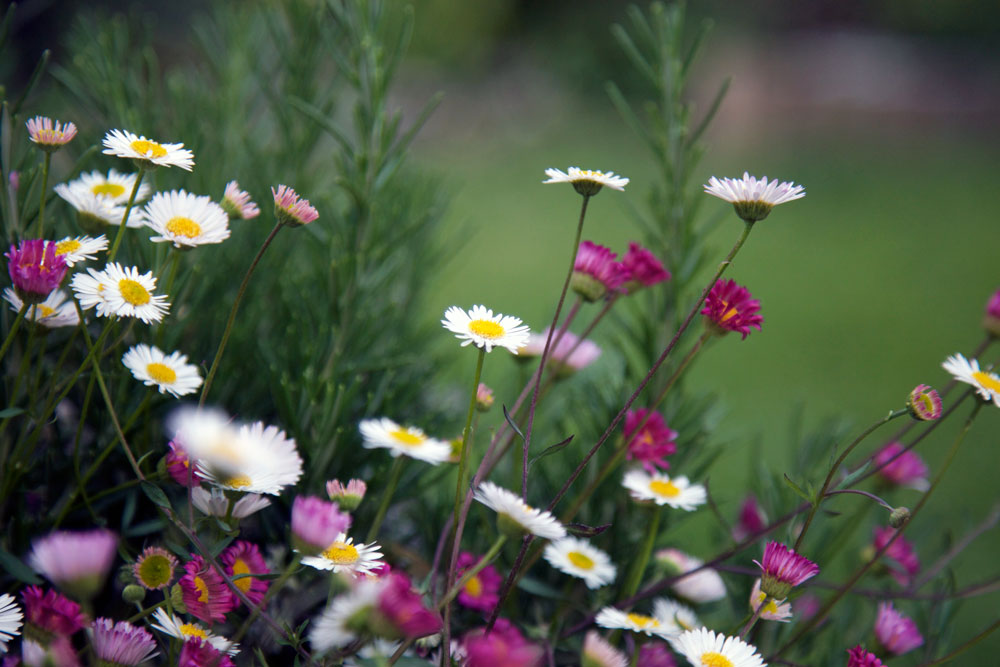
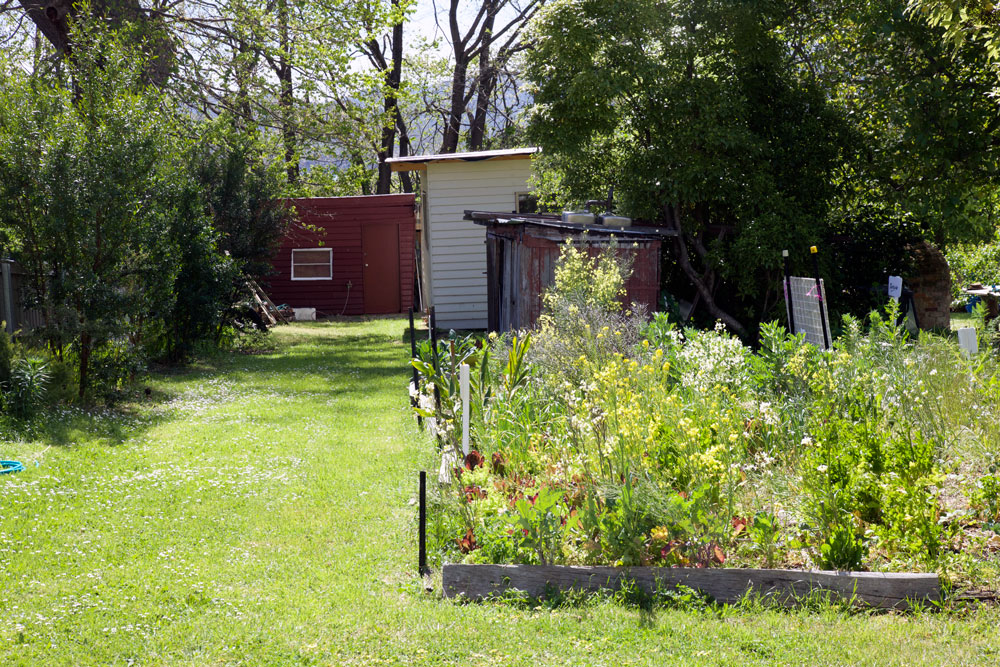
I was recently in Hobart with a team from Frontyard for the Hobiennale. Hosted by Kickstart Arts, we spent four days making a book based on conversations emerging from our online image archive. We also did our best to get to know the site, St John’s Park. Across the road from our makeshift publishing office in the Orphan School Building, is St Johns Community Orchard, where there are plots available for groups of people to grow their own food. Ruth Mollison initiated the garden, after peaking over the fence and seeing a huge walnut tree and a lot of potential. I spoke to her as she planted wormwood, a natural pesticide, at the edge of the chicken hut.
AC: What do you think about permaculture?
Well, because of my family connections, because I am related to Bill, people think I am an expert, but I’m not a permaculture expert. I think the basic idea of it is a really good idea. But permaculture is sometimes associated with certain demographics and you have to be careful about that. I am a bit cynical about it at times as well.
Gardens like this should be really inclusive. I think the ideas behind permaculture are really great too and things like ‘the problem is a solution’ are a way of thinking laterally that is quite freeing. I’m not a permaculture fanatic by any means.
AC: How about edges?
The idea of edges, I’ve always liked that. I apply it to habitat because I really like native vegetation. That’s my real love in life, and salt marshes are my favourite hang out, and that’s an edge, the perfect edge habitat. But this garden is about community. So its nice to apply that in a social sense because in a way that’s what this garden could be seen as brings people out of their silos and brings them together.
You have to be careful of ‘group think’, because it’s easy to fall into that. We have lots of communities here and different types of people. The ex-minister is one of the main gardeners. We lease the space from the Anglican Church. And we have to pay rent, and insurance and everything else. The Church owns the only bit of freehold land in this area. But other than that, the garden is not at all churchy. We have a whole mix of people.
We keep the garden as open as possible. There is no a lock on the gate. Anyone can come in and be in the garden.
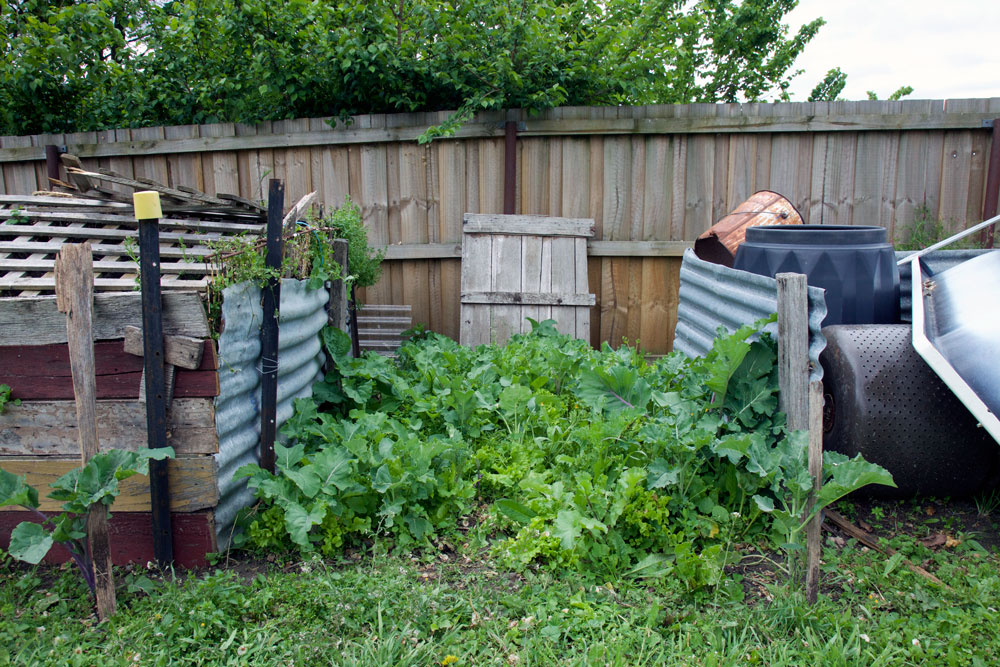
Lettuces growing between the compost piles.
AC: How did you get it started?
This garden is the back yard of the church rectory. The church was issued a fire abatement notice because it was just full of weeds. They were considering turning it into a car park for the state government offices nearby.
You couldn’t even see the boundary fences for weeds. I used to look over the fence and think ‘this is like a secret garden’, because you could just see the trees popping up through the weeds. And I thought ‘I would love to get into here’. And I got some friends together and we started. The landlord put a fence in, to separate the orchard from the house, and they said ‘you can have it for six months – if you don’t get it in hand, we’ll have it back.’ That was five years ago.
We had an army of whipper snippers, just to get it in hand and see the possibility through the mess.
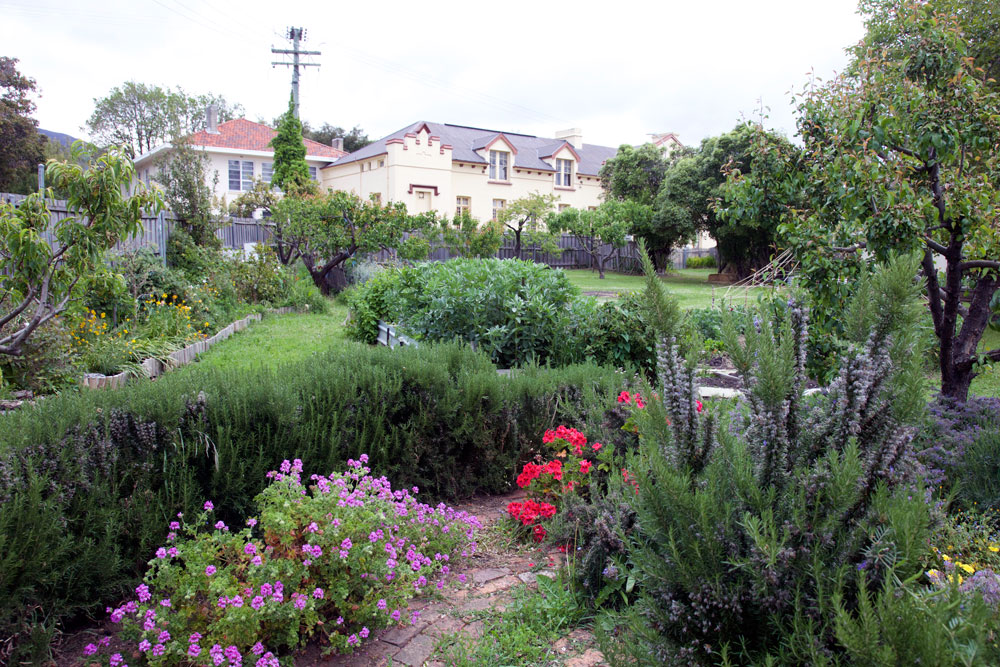
And then we put all the beds in, and that’s a herb spiral there. Different people have done different things. There was a lady working in mental health and she said these spirals are really good for people who feel stressed to walk around and around. And she really wanted to do that. So off she went.
We’ve got the chooks happening, and we put the raspberries in here. This is an original heritage chook pen, and we just fixed it up. When we saw photos from the 1930s there was a whole row of these here, because this was a government farm and they used to breed chooks to get chooks that laid all year. So we’ve kept it. The Karen-Burmese have space here to keep a flock of chooks. They collect the eggs and eat the roosters. They sell the eggs, to get money to buy the chook food.
And this wormwood. Apparently it’s a really good insecticide. So the idea is that we make hedge and then we clip it and then put it inside their nest boxes to keep the chooks healthy. And next to them we have a green crop and the chooks can eat all of that and then we will swap it over.
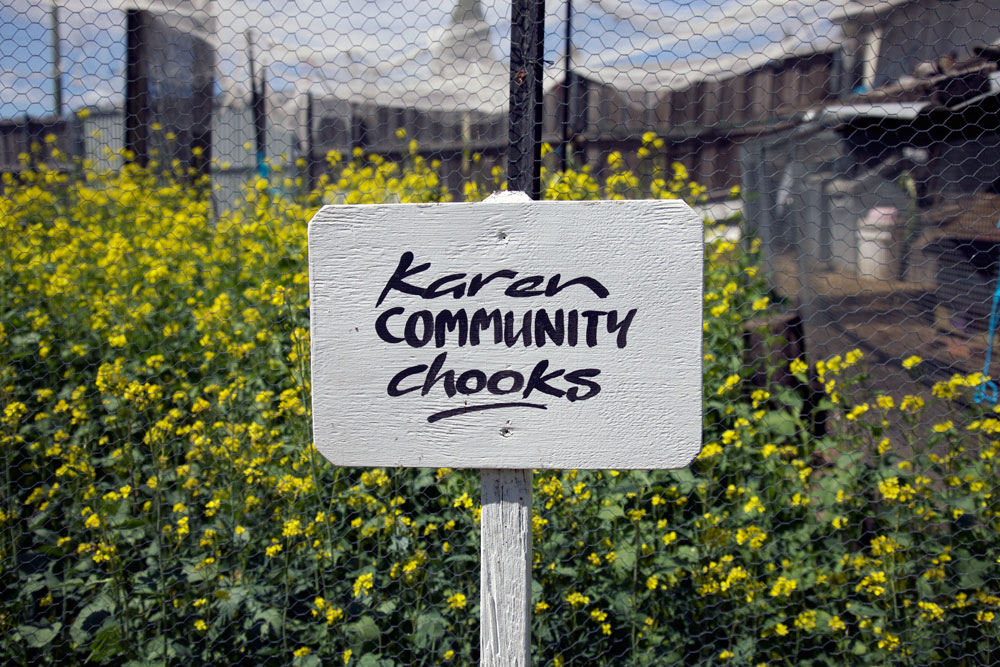
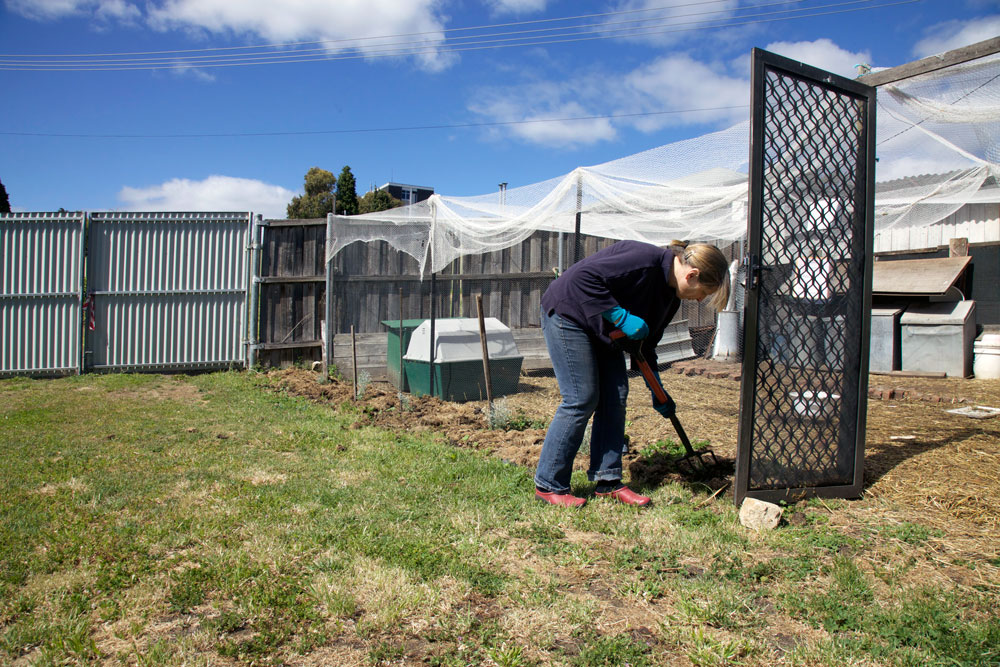
AC: So have you done this before, a community garden?
Well I’m drawn to it. I’ve done other community things, not a garden, but I’ve done a nursery that’s still going. My background is the natural sciences. I was a librarian and I’ve just gone back to doing that. I found it boring when I was younger but it’s a handy job when you’re older.
But I like being outdoors. I was on the committee, but have handed over my position to others. I feel like it’s time to bow out and just come and poke around in the garden rather than be the one responsible for organising it. I set it up because I thought I’ve got to do something to get to know the neighbours. I was in a new house and a new suburb – and I started this community group, which worked on this garden. And I ended up getting married to one of the gardeners. So there you go.
AC: How did you learn to garden?
I just picked things up. I learned from my mother and my grandmother more than my father probably. You know, they were all very Tasmanian, including Dad, which means that they know the climate, and they’ve just always had big back yards where you had some chooks and the veggie garden and some fruit trees. You know that’s really not so common anymore, even in Hobart. Developers move in, and cover all the surfaces.… I think people are tired of screens and virtual living, people want to get back to real living and real skills.
We have become so separate from where our food comes from. But generations need to work together.
Our Facebook page was taken on my one of our young members. And we had the best turn out we’ve had- it worked. And we didn’t have to do anything to make it work. It can be used as a tool. But I think you also need to sit down and have a cup of tea and check in. That’s the best thing. Nothing can quite replace that.
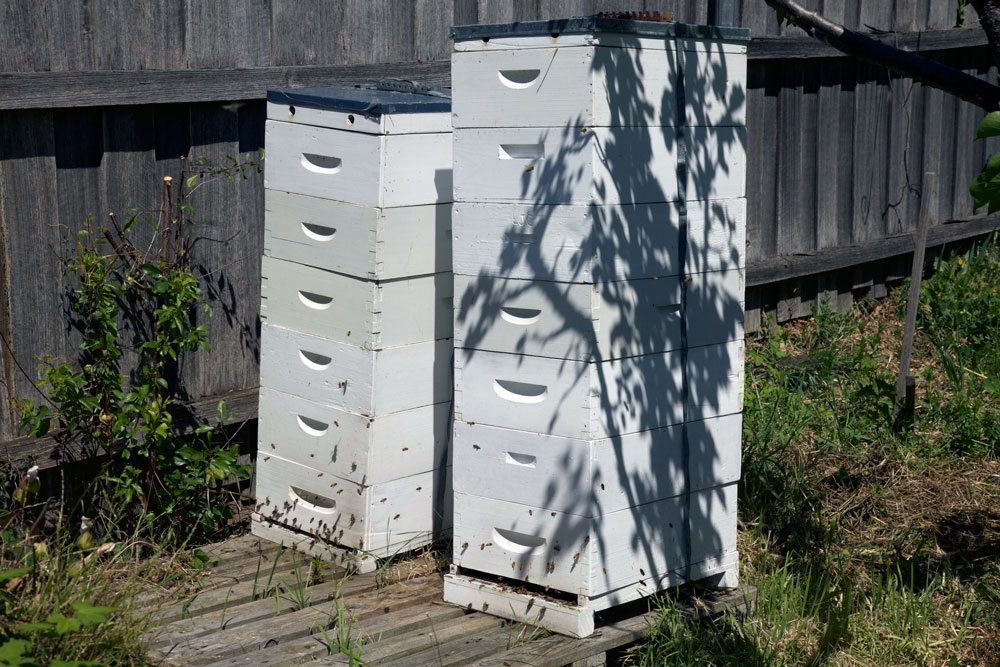
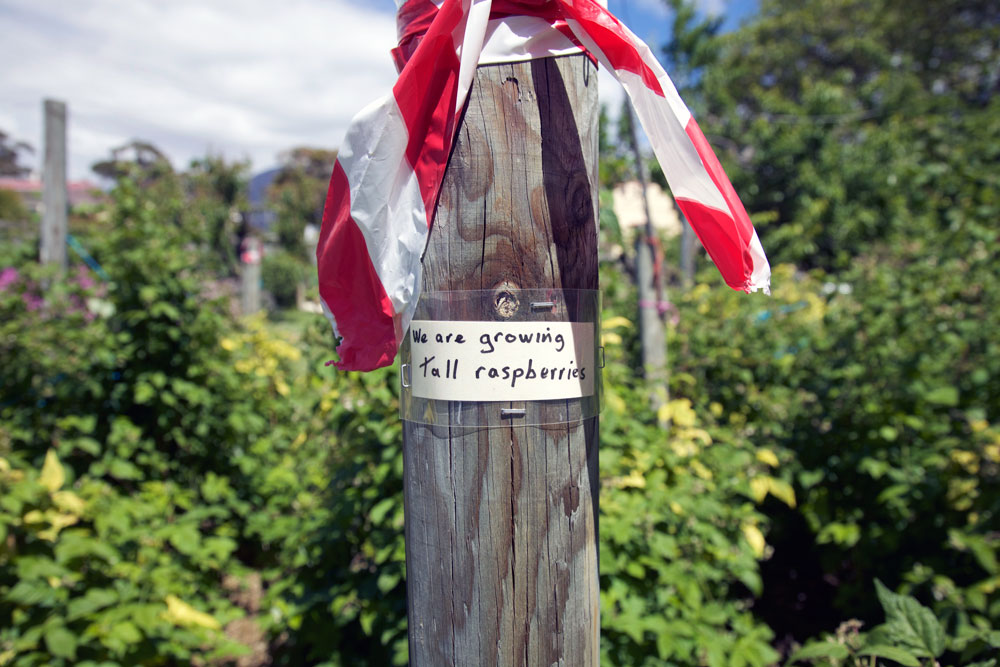

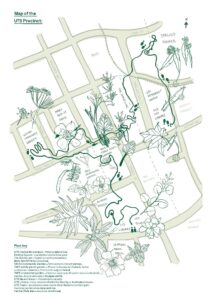
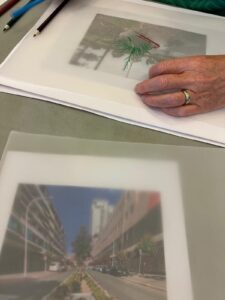
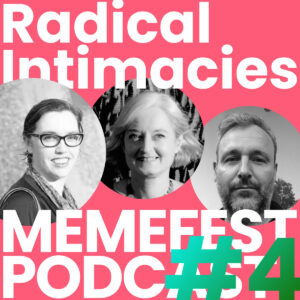
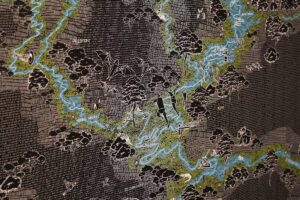
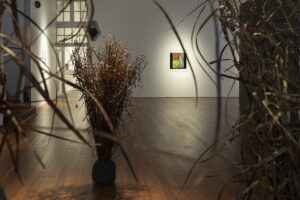
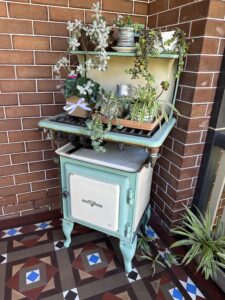
0 Comments